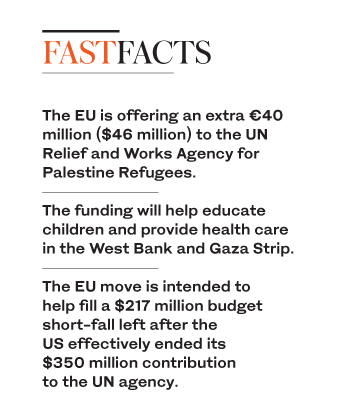NEW YORK: Facing a financial crisis after the US cut funding, the head of the UN agency that helps 5.3 million Palestinian refugees says the problem of their well-being will continue to exist whether there is money or not — and especially if it was forced to shut down.
While the UN Relief and Works Agency (UNRWA) got some good news on Wednesday with new pledges of $118 million, it remains $68 million in the hole this year. And in January, it will face the problem of trying to find funding for next year’s budget of about $1.2 billion.
“Of course, we worry about it,” UNRWA Commissioner General Pierre Krahenbuhl said.
“The key question for next year will be whether these countries that have shown themselves so generous in supporting us this year ... are they prepared to sustain those contributions?”
As Krahenbuhl sat down for an interview with The Associated Press about the agency’s future on Thursday, Palestinian leader Mahmoud Abbas told the UN General Assembly that UNRWA is critical to millions of his people but US officials “just want to obliterate it altogether.”
UNRWA was established after the war surrounding Israel’s establishment in 1948 to aid the 700,000 Palestinians who fled or were forced from their homes. Today, it provides education, health care and social services to 5.3 million Palestinians in the West Bank and Gaza Strip, as well as Jordan, Syria and Lebanon.
Krahenbuhl said the sudden US funding cut of $300 million early this year and the Aug. 31 announcement by the Trump administration that it was ending decades of funding for UNRWA were “a matter of deep regret and sincere disappointment” since the US was historically the agency’s largest donor, paying nearly 30 percent of its budget.
“But it’s a disappointment also because the decision was taken for political reasons,” he said.
“It’s not in relation to our performance, and that makes it very difficult for a humanitarian organization because for political reasons we’re related and adjusted to the tensions between the US and the Palestinian leadership.”
“It’s very important to protect humanitarian funding from these forms of politicization,” Krahenbuhl stressed.
In announcing the end to funding, the US called UNRWA an “irredeemably flawed operation.” The Trump administration’s top Mideast adviser, Jared Kushner, went further in an internal email published by Foreign Policy magazine. He was quoted as calling for a “sincere effort to disrupt UNRWA” and saying the agency “perpetuates a status quo, is corrupt, inefficient and doesn’t help peace.”
Israel, which praised the end of US funding, accuses UNRWA of perpetuating the Israeli-Palestinian conflict. Some Israelis accuse the agency of teaching hatred of Israel in its classrooms and tolerating or assisting Hamas.
Krahenbuhl rejected all the allegations and touted the quality of UNRWA schools, saying it was a touch-and-go decision to open them for the new school term that started in August.
“The fact that donors came forward — Gulf countries, Asia, Europe, Canada and others, helped us and allowed us to open the school year,” he said.
Krahenbuhl said “the most remarkable” funding increases have come from Gulf countries.
He said other countries have also increased contributions including India from $1 million to $5 million as well as China, Japan, Britain, Germany, Sweden and some EU countries.
At a UN event hosted on Thursday by UNRWA and Jordan, diplomats said Kuwait pledged $42 million and the EU pledged €40 million to help Palestinian refugees this year.
The Palestinians fear the US is putting pressure on host countries to absorb their refugee populations and eliminate the issue from future peace negotiations.
Kushner and Jason Greenblatt are preparing a highly anticipated peace plan for Israel and the Palestinians. President Donald Trump said on Wednesday for the first time that the US supports a two-state solution.
Two-state solution
Krahenbuhl reiterated that UN Secretary-General Antonio Guterres strongly supports a two-state solution and has said there is “no Plan B.”
He stressed that a peace deal “has to be inclusive of the concerns and aspirations of Palestinian refugees.”
The Palestinians also say the attempt to define who is a Palestinian refugee by Israel and the US is an attempt to get the issue on the negotiating table, just as the Trump administration did with Jerusalem by recognizing it as Israel’s capital.
Krahenbuhl said the UN General Assembly, where UNRWA’s mandate originated, states clearly that refugees and the children, grandchildren and descendants are recognized as refugees. He noted that the UN refugee agency has the same definition.
“It is not for an individual member state to modify that or to suddenly suggest unilaterally that there is a change in numbers,” he said.
As for those who would like to see UNRWA disappear, Krahenbuhl said: “At the end of the day, whether UNRWA exists or not is not the core question.”
That question is: “Is the international community prepared to bring about a political solution that is at the heart of the continued existence of this refugee community 70 years after” the 1948 war?, he asked.
“I’m certain the Palestinian refugees would like nothing more than a horizon that opens and tells them something different can be achieved with an independent state of their own,” he said.



























